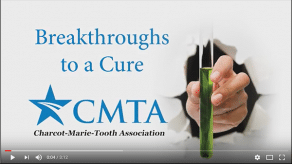
New Research Shows Promise for CMT Progressive Neuromuscular Disease
Potential treatment offers hope for over 2.8 million affected worldwide
Glenolden PA, December 4, 2017—A new paper published December 4th on the Journal of Clinical Investigation (JCI) website reveals an exciting potential treatment for patients with Charcot-Marie-Tooth (CMT), the progressive neuromuscular disease that affects more than 2.8 million people worldwide. Scientists at Ionis Pharmaceuticals, in collaboration with the Charcot-Marie-Tooth Association (CMTA), have identified a promising early-stage therapeutic approach with antisense technology for CMT Type 1A (CMT1A), the most common form of the disease, accounting for half of all cases. There is currently no treatment or cure for CMT, making the CMT1A research a significant and hopeful breakthrough for medical researchers, healthcare professionals, patients and families.
CMT is the most commonly inherited peripheral nerve disorder. The disease causes damage to the peripheral nerves that control muscles. It is progressive, causing loss of normal function and sensation in the lower legs, feet, hands and arms. While not usually fatal, CMT can be severely disabling. CMT1A is caused by the duplication of the peripheral myelin protein 22 gene (PMP22), which affects the myelin sheath of the nerves, causing neuropathy and muscle atrophy.
Reducing the level of PMP22 protein has long been considered the most promising treatment approach for CMT1A. For the study, Ionis researchers used their expertise as a world leader in developing antisense oligonucleotides, which precisely target the products of genes that cause diseases. They developed antisense drugs designed to reduce the amount of the PMP22 messenger RNA (mRNA), which in turn reduces production of the PMP22 protein. The researchers then tested the most potent antisense compounds in two different animal models of CMT1A. In both models, weekly injections of the PMP22-targeting antisense drug inhibited the progression of neuropathy, and even improved some aspects of neuropathy during the treatment.
“Our researchers have successfully developed antisense drugs for other neurologic diseases, such as spinal muscular atrophy and polyneuropathy resulting from hereditary transthyretin amyloidosis,” said C. Frank Bennett, PhD, senior vice president of research and leader of the neurological disease franchise at Ionis. “The results we have seen thus far for CMT1A are very promising, but more work is needed to determine if these studies in rodents can be translated to a therapy for CMT1A patients. Our scientists are working diligently with the Charcot-Marie-Tooth Association (CMTA) and academic collaborators to translate the findings from these exciting preclinical studies to the identification of a potential drug for the treatment of patients with CMT.”
Motivated by the exciting preclinical findings, Ionis has been optimizing antisense drugs against human PMP22 mRNA to identify those that have the most promise for future clinical trials in people with CMT1A.
“We are getting closer to delivering therapies for a disease that, until today, has had no viable treatment options,” said Amy Gray, CEO of the Charcot-Marie-Tooth Association. “Thanks to our donors and our partnership with Ionis, we have made an important stride in advancing a potential drug toward the clinic for patients affected by CMT1A. Our progress demonstrates the importance of CMTA funding and will encourage supporters to believe in a future where people with this disease may be able to walk, run, dance and enjoy life to the fullest.”
The CMTA is the world’s leading nonprofit dedicated to finding a cure for Charcot-Marie-Tooth. The CMT1A research is part of the organization’s Strategy to Accelerate Research (STAR) program that brings top researchers together with pharmaceutical partners—and donors willing to fund their research—so that scientific breakthroughs are possible.
For more information about the research paper, please go to www.cmtausa.org.
About the Charcot-Marie-Tooth Association
The CMTA (www.cmtausa.org) is a patient-led nonprofit that is aggressively searching out a treatment for CMT by putting together a group of top-flight researchers and experts and directly funding their work. The CMTA also offers a variety of educational materials and conferences to the CMT community throughout North America, provides physician referrals and works closely with the clinical and research communities.
For media inquiries, please contact:
Melanie Otero
JLM Communications
melanie@jlmcommunications.net
305-321-6447
Frank Gaidjunas
Director of Marketing and Communications
Charcot-Marie-Tooth Association
frank@cmtausa.org
224-374-6038





